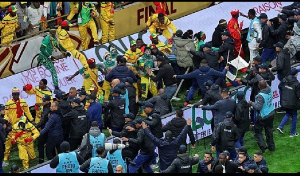- And From Where Will It Be Funded?
By Kofi Thompson
Today, I am reproducing a story written by reporters of the UK newspaper, the Daily Telegraph, entitled: "£230 million British aid programme to support schools in Nigeria is failing".
It is my two-pesewa contribution to the debate about free secondary education in Ghana.
There are many discerning Ghanaians who feel that somehow the lack of a proper national debate on the subject, might lead society to sleepwalk towards a possible future disaster, which might destroy second-cycle education, and possibly dislocate our national economy on top of that too.
One hopes, therefore, that the discerning and independent-minded Ghanaian patriots, whose crucial swing-votes now determine who becomes Ghana's president, will step back and make up their minds that they will prevent a gigantic fraud being perpetrated on ordinary people in Ghana.
If the uncharitable in our midst are right about them, then those they describe as "ruthless and determined politicians", who they allege care precious little about the education of ordinary people, but are nonetheless using the promise of free secondary education as a clever campaign-carrot ploy, to enable them win power, ought to be prevented from succeeding in their cynical aim, at all costs.
Let this culled story about the shortcomings of education in Nigeria, serve as a warning of what possibly awaits ordinary Ghanaians in the not too distant future - if decent and independent-minded people are prevented from demanding answers to the troubling question of how we will fund free second-cycle education in Ghana on a sustainable basis, and, above all, precisely how much it costs our nation over the first four years. Please read on:
"A £230 million British aid programme to support schools in Nigeria has failed to produce any major improvement in pupil learning, the development watchdog said today.
By Telegraph reporters
6:00AM GMT 20 Nov 2012
The Independent Commission for Aid Impact (ICAI) said the UK's education programme in Nigeria was being undermined by a shortage of effective teachers and a lack of support from local state governments.
On its system traffic light ratings, the commission ranked the scheme amber-red - the second lowest rating - indicating "significant improvements" were required.
To date, the Department for International Development (Dfid) has spent £102 million on supporting education in 10 of Nigeria's 36 states, with a further £126 million committed to 2019.
However, the commission found that around a third of the eligible children - an estimated 3.7 million - were still not in school, while those that were received little by way of education.
"We are concerned by the very high numbers of out-of-school children and the very poor learning outcomes in nine of the 10 Nigerian states supported by Dfid," it said.
"Dfid's education programme in Nigeria operates in a very challenging environment, with too few effective teachers, poor infrastructure and unpredictable state funding all contributing to poor learning outcomes for pupils in basic education.
"Our review indicates no major improvement in pupil learning."
The findings will further add to the pressure on ministers over the aid budget, with many Tory MPs strongly opposed to David Cameron's commitment to maintain overseas aid at a time of spending cuts at home.
ICAI chief commissioner Graham Ward said: "The communities we spoke to in Nigeria want their children to become self-reliant by learning to read and write.
"In our view, Dfid's programmes will only become sustainable when they can routinely help to unlock state governments' budgets to fund the required improvements both adequately and equitably."
A spokesman for Dfid said: "This was a limited enquiry in that the team only visited one per cent of schools, most of which were in only one state in Nigeria, and they did not take into account the most recent evidence of the projects' progress. However, we will carefully review the report's recommendations and respond in due course."
End of culled Daily Telegraph report.
Whiles a very good and progressive idea, it is essential, dear reader, that no political party is allowed to get to power in Ghana, promising free secondary education, without thoroughly explaining exactly what the "free" in its promised free second-cycle education policy proposal consists of, precisely how much it will cost our nation over a 4-year period and from whence those funds will be sourced. A word to the wise...
Tel: 027 745 3109.
Email: peakofi.thompson@gmail.com
Opinions of Thursday, 22 November 2012
Columnist: Thompson, Kofi














